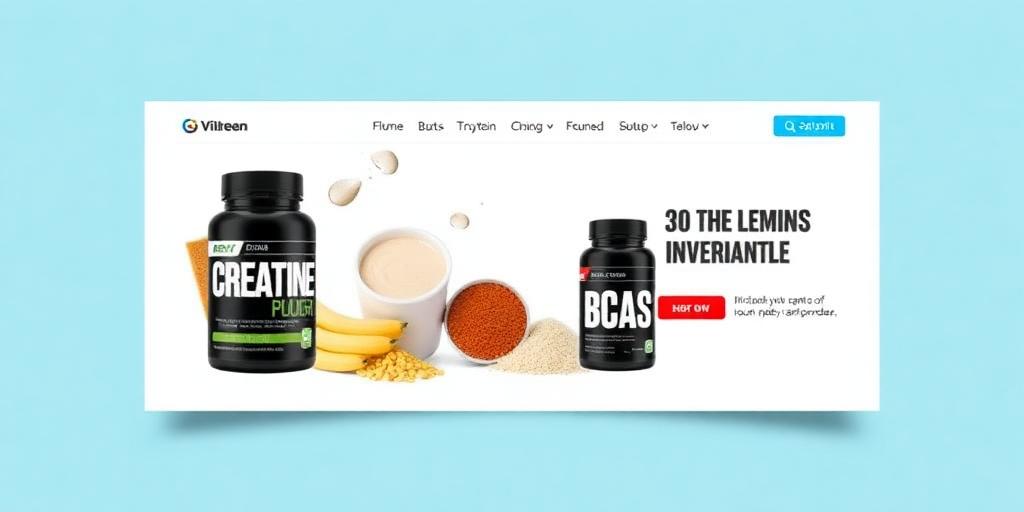The Top 3 Supplements for Fitness Nutrition (Based on Science)
Proper nutrition is essential for achieving your fitness goals, whether you're aiming to build muscle, lose weight, or improve athletic performance. While a balanced diet should always be the foundation, certain supplements can provide an extra edge by filling nutritional gaps and enhancing specific aspects of your fitness journey. This article will explore the top 3 science-backed supplements that can significantly impact your fitness nutrition.
1. Creatine: Powering Performance and Muscle Growth
Creatine is one of the most well-researched and effective supplements for enhancing muscle mass and strength. It works by increasing the availability of ATP (adenosine triphosphate), the primary energy source for muscle contractions.
Benefits of Creatine:
- Increased Muscle Strength and Power: Creatine supplementation has been shown to significantly improve strength and power output during high-intensity exercises.
- Enhanced Muscle Growth: By increasing workload capacity, creatine indirectly supports muscle growth by allowing you to perform more reps and sets.
- Improved Exercise Performance: Creatine can delay fatigue and improve endurance during short bursts of intense activity.
- Cognitive Benefits: Some studies suggest creatine may also have cognitive benefits, such as improved memory and focus.
Dosage and Usage: The most common and effective method is creatine monohydrate. A typical dosage involves a loading phase of 20 grams per day for 5-7 days, followed by a maintenance dose of 3-5 grams per day.
2. Protein Powder: Fueling Muscle Recovery and Growth
Protein is the building block of muscle tissue, and adequate protein intake is crucial for muscle repair and growth, especially after exercise. Protein powder is a convenient and efficient way to meet your daily protein needs.
Benefits of Protein Powder:
- Muscle Recovery: Consuming protein after exercise helps repair damaged muscle fibers and reduces muscle soreness.
- Muscle Growth: Protein provides the necessary amino acids to support muscle protein synthesis, leading to increased muscle mass.
- Convenience: Protein powder is a quick and easy way to boost your protein intake, especially when you're short on time.
- Weight Management: Protein can increase satiety and reduce cravings, which can be helpful for weight loss or maintenance.
Types of Protein Powder:
- Whey Protein: A fast-digesting protein derived from milk, ideal for post-workout recovery.
- Casein Protein: A slow-digesting protein, perfect for consuming before bed to promote muscle recovery overnight.
- Soy Protein: A plant-based protein source that provides all essential amino acids.
- Pea Protein: Another plant-based option, easily digestible and suitable for individuals with dairy allergies.
Dosage and Usage: Aim for 20-40 grams of protein after workouts to optimize muscle recovery and growth.
3. Branched-Chain Amino Acids (BCAAs): Reducing Muscle Soreness and Fatigue
Branched-chain amino acids (BCAAs) are essential amino acids that play a crucial role in muscle protein synthesis and recovery. They include leucine, isoleucine, and valine.
Benefits of BCAAs:
- Reduced Muscle Soreness: BCAAs can help reduce delayed onset muscle soreness (DOMS) after intense exercise.
- Decreased Muscle Fatigue: BCAAs may help reduce fatigue during prolonged exercise by serving as an energy source for muscles.
- Enhanced Muscle Recovery: BCAAs can stimulate muscle protein synthesis and promote muscle repair.
- Preservation of Muscle Mass: During periods of calorie restriction, BCAAs can help prevent muscle breakdown.
Dosage and Usage: A typical dosage is 5-10 grams of BCAAs before, during, or after exercise.
Conclusion
While supplements should complement a well-rounded diet and exercise program, creatine, protein powder, and BCAAs are three science-backed options that can provide significant benefits for fitness enthusiasts. Creatine boosts strength and power, protein powder supports muscle recovery and growth, and BCAAs reduce muscle soreness and fatigue. Incorporating these supplements strategically can help you optimize your fitness journey and achieve your desired results. Always consult with a healthcare professional or registered dietitian before starting any new supplement regimen to ensure it's appropriate for your individual needs and health status.









